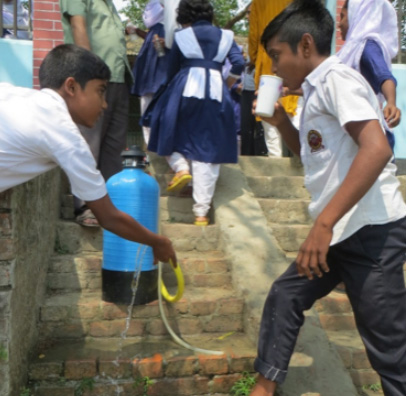community filters

Community filter systems are a good way to provide access to clean water for low-income families. Such systems can be used particularly efficiently at schools, market places or railway stations. In contrast to small filter systems, such large filters can be serviced and maintained by one operator.
As an alternative to the outdated SIDKO systems, we want to equip schools with inexpensive and backwashable filters. The first prototypes have already been in successful operation since 2017 and are being continuously optimized. In the following article we show the beginnings of the projects with the installation of SIDKO filters up to the current developments with innovative technology in cooperation with universities and industry.
left: Water filter, sponsored by WatchWater, produces arsenic free water at a school in Dadpur.
Read more … community filters